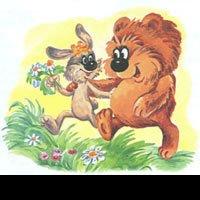ДРУЖБА.
AMITIÉ
friendship
amizade
DOSTLUK
amicizia
友情
FREUNDSCHAFT.
FRIENDSHIP.
AMISTAD.
AMITIÉS.
AMICIZIA.
프렌드십.
AMIZADE.
ARKADAŞLIK.
友谊。
Дружба.
Dostluk.
Однажды утром Медвежонок проснулся и подумал:
un matin||Petit ours|s'est réveillé||
one day|in the morning|the little bear|woke up||thought
||urso|acordou||pensou
||der kleine Bär|||
Bir sabah||ayıcık|uyandı||düşündü
un giorno||il piccolo orso|si svegliò||
ある朝|朝に|クマの子|目を覚ました||考えた
One morning, the bear cub woke up and thought:
«В лесу много зайцев а мой друг Заяц — один.
|||les lièvres||||le lièvre|
in|||hares||||hare|
|||coelhos||||Zayats|
|||Hasen|||||
|ormanında||tavşanlar|||||
|nel bosco||conigli||||il mio amico|
|森に||ウサギ||私の||ウサギ|
Im Wald gibt es viele Hasen, aber mein Freund Hase ist einer.
«There are many hares in the forest, but my friend Hare is the only one.
Надо его как-нибудь назвать!»
||||nommer
somehow|him|somehow|somehow|to name
||||chamar
bir şekilde||||adlandırmak
bisogna||||dargli un nome
必要がある||何か|何か|呼ぶ
Ich muss ihn irgendwie benennen!
I need to come up with a name for him!»
И стал придумывать своему другу имя.
||inventer|||
and|started|to come up with|to his|to his|a name
|ficou|inventar|seu|amigo|
||einen Namen ausdenken|||
|olmaya başladı||||
|e cominciò|inventare|||
|になった|考える|自分の||名前
Und begann, für seinen Freund einen Namen auszudenken.
And he started coming up with a name for his friend.
«Если я назову его ХВОСТИК, — думал Медвежонок, — то это будет не по правилам, потому что у меня тоже есть хвостик... Если я назову его УСАТИК, это тоже будет нехорошо — потому что и у других зайцев есть усы... Надо назвать его так, чтобы все-все сразу знали, что это — мой друг».
||appellerai||Queue||||||||les règles|||||||queue|||je l'appelle||Moustachu||||pas bien||||||||moustaches|||||||||||||
if||name||a little tail|thought|bear cub|to|it|will|not||by the rules|because||||too||little tail|||name||Usatik|this||will|not nice|because|it|and||other|hares|have|tail|need|name||like|that|everyone|everyone|immediately|knew|||my|a friend
||nomear||HIVINHO|pensou|||||||regras||||||||||||Morrendo||||||||||||bigodes||||||||imediatamente|sabiam||||
||||||||||||den Regeln||||||||||||Schnurrbart||||||||||||||||so|||||||||
Eğer||||Kuyrukçuk|||||olacak||||çünkü||||||kuyrukçuk|Eğer||||bıyıklı||||kötü olur|çünkü||||diğer|||bıyıklar||||öyle||||hemen|biliyorlar||||
||chiamerò||Coda||||||||regole|||||||coda|||||il baffuto||||non va bene||||||||baffi||||||||subito|sappiano||||amico
もし||呼ぶ||しっぽ|||||だろう|||ルール||||||||||||ヒゲウサギ||||よくない|||||他の|||ひげ|||||ために|みんな||すぐに|知っている||||
“Wenn ich ihn SCHWÄNZCHEN nenne, dachte das Bärchen, dann wäre das nicht richtig, weil ich auch ein Schwänzchen habe... Wenn ich ihn SCHNURRBÄRTCHEN nenne, wäre das auch nicht gut - weil auch andere Hasen Schnurrbärte haben... Ich muss ihn so nennen, dass alle sofort wissen, dass es mein Freund ist.
“If I call him LITTLETAIL,” thought the Teddy Bear, “it wouldn't be right, because I also have a little tail... If I call him WHISKERS, that wouldn't be nice either - because other rabbits have whiskers too... I need to give him a name that will make everyone immediately know that he is my friend.”
И Медвежонок придумал.
||a inventé
||came up with
|il piccolo orso|ha inventato
||pensou
||考えた
Und das Bärchen erfand.
And the Teddy Bear came up with an idea.
— Я назову его ЗАЯЦДРУГМЕДВЕЖОНКА?
Je|||Lapin ami ours
|||rabbitfriendlittlebear
|||CoelhinhoAmigoDoUrsinho
|||HaseFreundB
|||coniglio amico or
|||ウサギ友達
– Ich werde ihn HASEFREUNDBÄRCHEN nennen?”
“I will call him RABBITFRIENDBEAR?”
— прошептал он.
il chuchota|
whispered he|
sussurrò|
sussurrou|
ささやいた|
- He whispered.
— И тогда всем-всем будет понятно.
|||||clairement
and|then|everyone|||understood
|その時||||わかるだろ
||a todos|||claro
|||||chiaro
И он соскочил с постели и заплясал.
||sauter||lit||a dansé
and||jumped out|with|bed||started dancing
e||saiu||||dançou
||sprang auf||||tanzte
||saltò|con|il letto|e|cominciò a ball
||飛び起きた||ベッド||踊り始め
And he jumped out of bed and danced.
— ЗАЯЦДРУГМЕДВЕЖОНКА!
rabbit friend bear cub
— HARE FRIEND LITTLE BEAR!
ЗАЯЦДРУГМЕДВЕЖОНКА!
Il coniglio amico
HARE FRIEND LITTLE BEAR!
— пел Медвежонок.
chantait|
sang|
sang|
cantava|
cantou|
— sang the Little Bear.
— Ни у кого нет такого длинного и красивого имени!..
|||||long||beau|
no||anyone||such|long||beautiful|name
|||||||schönen|
|||||lungo||bello|
||de ninguém||tal tipo de|longo||bonito|nome
Niemand hat einen so langen und schönen Namen!..
No one has such a long and beautiful name!..
И тут появился Заяц.
||est apparu|
and|here|appeared|
||è apparso|
|aqui|apareceu|
Und da erschien der Hase.
And then came the Hare.
Он переступил порог, подошел к Медвежонку, погладил его лапой и тихо сказал:
|a franchi|le seuil|s'est approché||le petit ours|l'a caressé||patte|||a dit
|übertrat||||dem Bärenjungen|streichelte ihn||der Pfote|||
|stepped over|threshold|approached||bear cub|patted||paw|and quietly said|softly|
|attraversò|soglia|si avvicinò||il piccolo orso|gli accarezzò||la zampa|||disse
ele|perdeu|limite|aproximou-se|ao|o Ursinho|pôde||pata||quietamente|
Er trat über die Schwelle, ging zum Bärenjungen, streichelte ihn mit seiner Pfote und sagte leise:
He crossed the threshold, approached the Little Bear, stroked him with his paw, and whispered softly:
— Как тебе спалось, МЕДВЕЖОНОККОТОРЫЙДРУЖИТСЗАЙЦЕМ?
||tu as dormi|le petit ours
how||did you sleep|bear cub
||hast du geschlafen|der Bärchen
||hai dormito|il piccolo orso
||dormiu|o ursinho que é amigo do coelho
- How'd you sleep, Bear who's friends with the Sightseer?
— Что?..
- Wie?
— переспросил Медвежонок.
demanda à nouveau|
asked again|
chiese di nuovo|il piccolo orso
perguntou novamente|
— The Bear cub asked again.
— Это теперь твое новое имя!
this||your|new|
— This is now your new name!
— сказал Заяц.
|der Hase
— Said the Hare.
— Я всю ночь думал: как бы тебя назвать?
|all|night|||would||name
|toda a||||||
— I thought all night: what to call you?
И наконец, придумал: МЕДВЕЖОНОККОТОРЫЙДРУЖИТСЗАЙЦЕМ!
|||der Bärchen
|finally|came up with|bear cub
|||il piccolo orso
And finally, I came up with: TEDDY BEAR WHO IS FRIENDS WITH A RABBIT!

